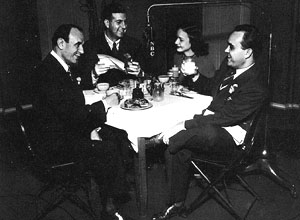| Right:
Don McNeill and unidentified members of the "Breakfast Club" cast in
an undated photo. |
 |
Curator's
note: Twenty-four hours after the Japanese attack
on Pearl Harbor, Don McNeill and the Breakfast Clubbers had
their hands full. News bulletins from New York and London repeatedly
interrupt the show. Until the broadcast's emotional final segment,
Don makes only the most oblique references to the tragedy of
the previous day and the declaration of war all know will follow
shortly.
Conductor Joe Gallicchio and his men are the heroes of the day,
repeatedly reaching into the back of the book to provide fill-in
music between bulletins and the smaller-than-scheduled portion
of the "Breakfast Club" show that gets on the air.
Of special note: two numbers by the "Four Vagabonds",
an African American vocal group that had been featured since
1938 on NBC-Chicago broadcasts.
Secondary NBC affiliate WCFL aired this broadcast in Chicago
from 8 to 9AM, CST.
Peruse the 1942
Breakfast Club Family Album and the 1953
Breakfast Club Year Book to learn more about the role this
broadcast played in wartime America and thereafter.
And watch streaming
video of a mini-documentary on the "Breakfast Club"
the curator put together in 2004. |
Download
the broadcast:
[you
will need RealPlayer
to listen to this broadcast].
- Segment
1 (runs 14:48): Opens with the end of a news bulletin from the NBC-Chicago
newsroom, a network id, the NBC chimes followed by fifteen seconds of silence
(for local station breaks). Following the show open the Four Vagabonds sing "I've
got Swing for Sale". The cast make light of Joe Gallicchio's bald pate and
Joe and the orchestra play "Two in Love". Nancy Martin steps to the
microphone to sing "Why Don't we do this More Often?" But a bulletin
from the NBC newsroom in New York intervenes before Gallicchio can deliver the
downbeat. Gallicchio and the orchestra begin a musical interlude near the end
of the first quarter-hour, but they're almost immediately cut off by a bulletin
from New York: Britain has just declared war on Japan.
- Segment
2 (runs 14:18): Most of the segment originates in London where Charles Collingwood
(CBS) and John McVane (NBC) provide analysis of Prime Minister Winston Churchill's
war declaration address to the House of Commons. The segment ends with a summary
of news bulletins from New York.
- Segment
3 (runs 16:05): A brief orchestral interlude from Joe Gallicchio ends the
second quarter hour followed by a fifteen-second pause for station identification.
Tenor Jack Baker leads off the third "call to breakfast". The second
half-hour of the show typically began with "march around the breakfast table".
It's especially spirited on this broadcast ("We march for the United States
armed forces, wherever they may be," Don proclaims). Nancy Martin sings "Be
Fair". New York breaks in and switches back to London where Collingwood and
McVane report on the conclusion of Churchill's speech. Back in Chicago, Gallicchio's
orchestra concludes the quarter-hour with an instrumental version of "I Want
to be Happy."
- Segment
4 (runs 14:24): Following some comedy Jack Baker sings "'Til Reveille".
Don segues into "inspiration time"---a regular feature of the final
quarter-hour, noting that "sometimes you can strike a giant who is dozing
momentarily. But when the giant awakens, look out." Gallicchio's orchestra
plays "White Cliffs of Dover" featuring muted strings. Nancy Martin
and Jack Baker sing a chorus of "Shine on, Harvest Moon". The Four Vagabonds
return with their arrangement of the ballad, "I'd Love You Again". Pianist
Bill Krenz plays "Make Believe" with the orchestra joining in on the
last chorus. Don ends the broadcast with his signature signoff: "So long---and
be good to yourself!"
|